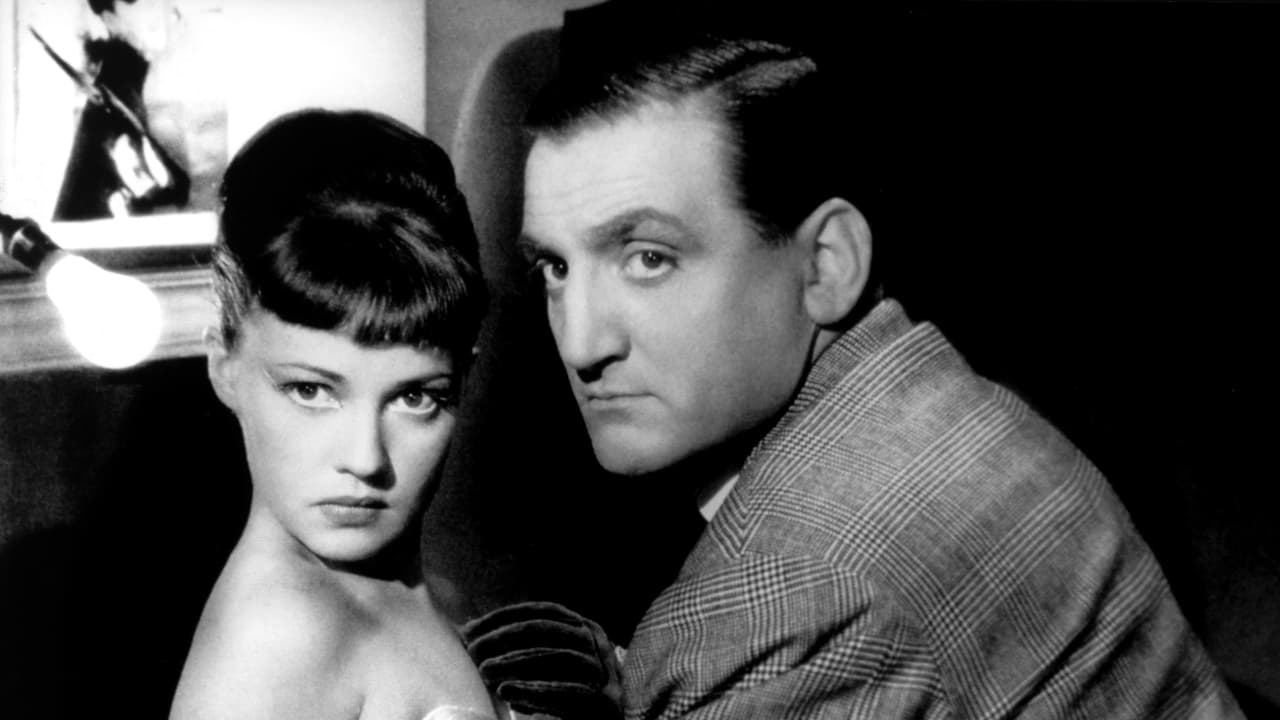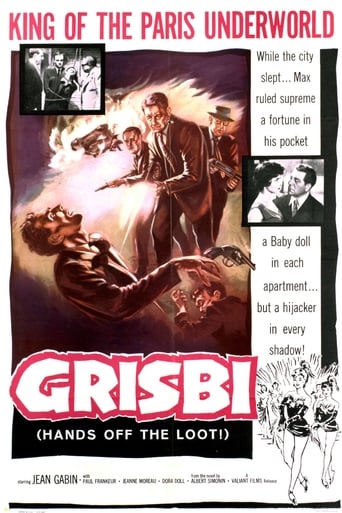

Too much of everything
... View MoreOne of my all time favorites.
... View MoreAbsolutely the worst movie.
... View MoreEach character in this movie — down to the smallest one — is an individual rather than a type, prone to spontaneous changes of mood and sometimes amusing outbursts of pettiness or ill humor.
... View MoreFor a movie that is more than a half century old this is surprisingly engaging. It proves that primary interest is driven by story rather than special effects.Jean Gabin plays Max, a fifty year old man who wants to get out of the crime business after having netted some 200 pounds of gold in a recent heist. Max has the gold stored away and a connection to fence the goods. This is an interesting twist for the start of a crime movie--the big heist has already taken place. But, not to worry, Max's partner in crime, Riton, leaks the information about the gold to his woman friend Josy (played by a young Jeanne Moreau); Josy deserts Riton and takes up with Angelo, a local drug dealer. Angelo finds out about the gold from Josy and the game is on as to who will wind up with the loot.Gabin plays Max as the ultimate sophisticated and cool character and Riton is Max's lovable but more impulsive sidekick. Riton and Max have been together for over twenty years and there is clear affection between them--Max refers to Riton as "Porcupine Head." Their friendship is central to the story. There are scenes that I think make this movie unique in the annals of crime drama. For example, when Max and Riton retire to Max's secret apartment to discuss the situation vis-à-vis Angelo, what we get is a quite domestic scene. Instead of yelling at Riton about his lack of discipline the two sit down and talk over wine, pâté, and crackers. Later Max brings out bedclothes for Riton and in separate scenes we watch Max and then Riton brush his teeth, not a common occurrence in crime dramas. I can't imagine any of these scenes being in a contemporary movie, but here they effectively illustrate the closeness between the two friends.The print on the Criterion Collection DVD is without blemish. I imagine no small effort went into restoring the original.The story unfolds at a pace to keep your interest. There are no showy camera angles or other arty effects, but there is some nice black and white photography. I found the ending most satisfying.
... View MoreSometimes actors never know when to quit--playing youthful roles long after they are obviously too old to realistically carry off the character. However, in a brave move, actor Jean Gabin plays a role of an older man who is simply tired and ready to call it quits on his life of crime. Gabin was 50 years-old when he made this film and, if anything, looks a good bit older than that--looking more like a man of 60. It was refreshing to see him playing such an unglamorous role.Max (Gabin) is a very cool guy. His manners are pretty effortless and he is a big man in the underworld. However, despite being "on top", he's very tired of the life and longs for retirement. Unknown to the other thugs, Max and his friend (Riton) committed a huge heist of 50,000.000 francs in gold a year earlier. That's because Max is smart--real smart. Instead of running away or spending the money, he just sat tight and did nothing to tip his hand. His contingency plans were brilliant as well and he seemed to have covered every base. Too bad that Riton wasn't quite as smart, as a "dame" weaseled this secret out of him and told another crook--who now is determined to get the gold. When Riton is captured, what will Max do? Will he leave his old friend or will he give up the gold to ransom Riton? And, even if he does surrender the loot, what then?! The film did a great job creating a Film Noir ambiance that is uniquely French. In the 50s, the French began imitating American Noir but often they made it uniquely their own--with grittier dialog (with much spicier language), a bit of nudity and a sharper edge. Aside from TOUCHEZ PAS AU GRISBI ("Don't Touch the Loot"), other such French films as BOB LE FLAMBEUR ("Bob the Gambler") and RIFIFI proved that in some ways, even, the French could do Noir better--achieving a certain realistic sleaziness that American censors wouldn't allow. For example, when Bob grabs a showgirl's breast backstage, you know this sure ain't a Hollywood film of the 50s! Overall, there's nothing not to like about the film. A very taut yet leisurely script, excellent acting and a dynamite finale--this film is terrific.
... View MoreThere's nothing exceptionally profound about the story to "Touchez pas au grisbi", one of Jacques Becker's later films -- but it sets up tons of film archetypes and patterns that later French Noir would emulate. Jean Gabin plays Max, an aging criminal set to retire with his friend, Ritan, when they're pushed into a state of paranoia by younger gangsters moving in on their retirement loot (their "grisbi").The film is not overtly flashy, but Max is one bad dude, expressed by the way he commands universal respect from his peers, patrons and the younger ladies who surround him. In fact, his musky appeal is hilarious in contrast with his romantically bumbling partner, as is the way he overtly womanizes (notice that none of the women in this film are wearing a bra!).There are only a handful of sets to the film, and a few outdoor scenes. The action happens suddenly and violently, which makes it much more jarring, and the themes of brotherly loyalty are expressed as both frustrating and endearing bonds, but with more nuanced definition than you might expect from such a straight-forward film. And to boot, there are some recognizable classic talents in this film, including Lino Ventura and Jeanne Moreau.While not explosive and over-the-top, the story, set-up and exposition of the gangster code are all the result of top-notch cinematic craftsmanship. The music is minimalist, the camera-work is easy on the eyes, and the characters are fun to watch. Half-goofily endearing and half-starkly serious, but mostly brilliant, Touchez pas au grisbi is a lot of fun.
... View MoreIt's a great pity that Marty Scorcese didn't catch this before embarking on a series of raw, brutal, in-yer-face gangster movies in which the likes of De Niro and Pesci rant like lunatics and call it acting. Here Jacques Becker delivers a gangster flick that is - wait for it - Subtle and Jean Gabin illustrates yet again that in screen acting less is more. Indeed Becker started something of a trend in French cinema with this entry for the very next year Jean-Pierre Melville weighed in with Bob, Le Flambeur, another underworld-setting film where violence is not of the scenery-chewing type. Were it not for the 'profession' of Max and Riton this could almost get under the wire as a comedy of manners or social commentary as Becker recreates lovingly and in great detail the milieu of the demi-monde in 50s Paris (like Bob, Le Flambeur, it begins with an Establishing Shot of Pigalle) and it's something of a master-stroke to begin the story AFTER Max and Riton have heisted a fortune in gold bars and stashed it away so that when we are introduced to them they could be part of a well-dressed group celebrating a family occasion - wedding, engagement, anniversary etc - rather than a seriously successful heist - even when Max reads about the score in a newspaper he gives no indication that he was the mastermind behind it. Of course conflict is called for and it arrives in the shape of Josie (Jeanne Moreau in an early role) the showgirl girlfriend of Riton who is tiring of him and prepared to switch her allegiance to Angelo (Lino Ventura in his impressive debut role), head of a rival gang, via putting him in the picture about the recent score. To cut to the chase Ventura's mob kidnap Riton and offer to trade him for the gold but in between Becker offers us a fascinating glimpse of a Parisian subculture where loyalty and friendship mean more than gold. As dbmonteuil said in another context on these boards (referring to Duvivier and Godard) I'd trade ALL of Marty Scorcese's crudeness for the elegance of this one.
... View More